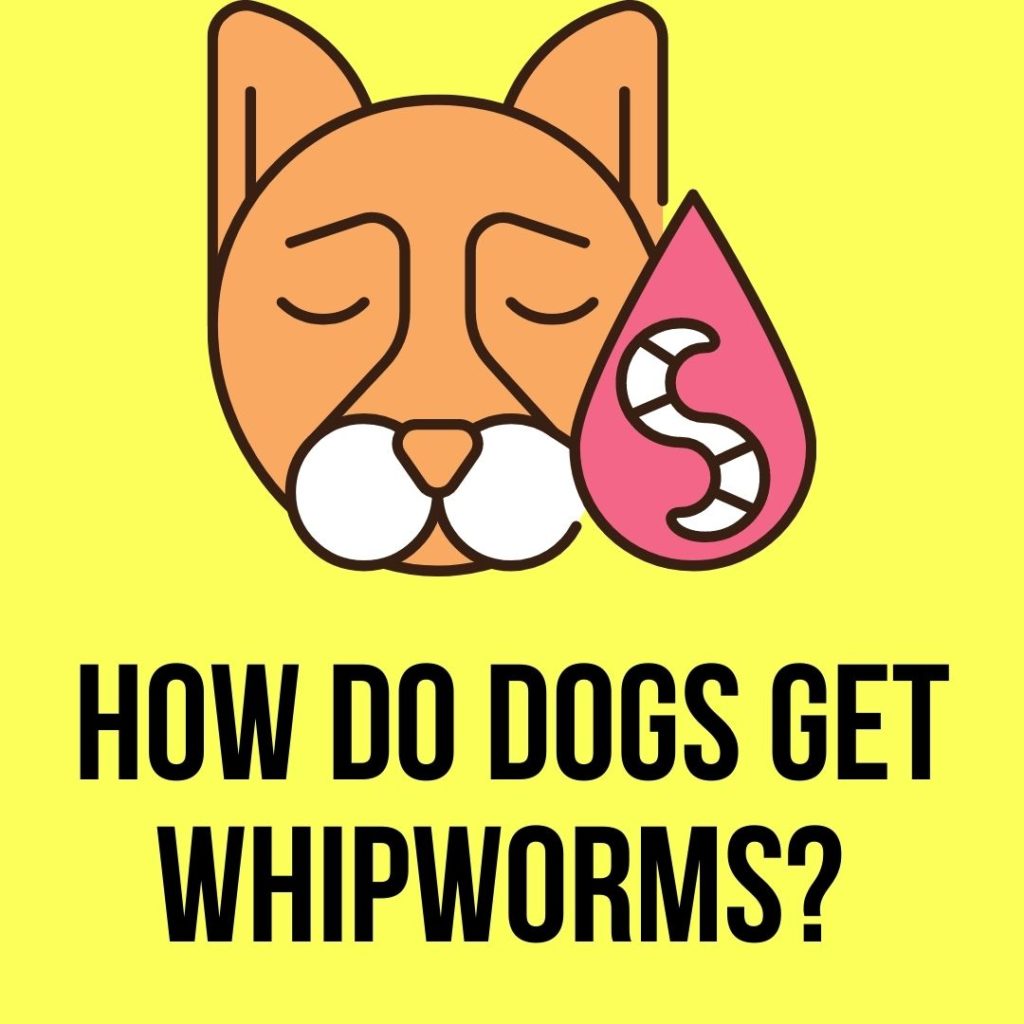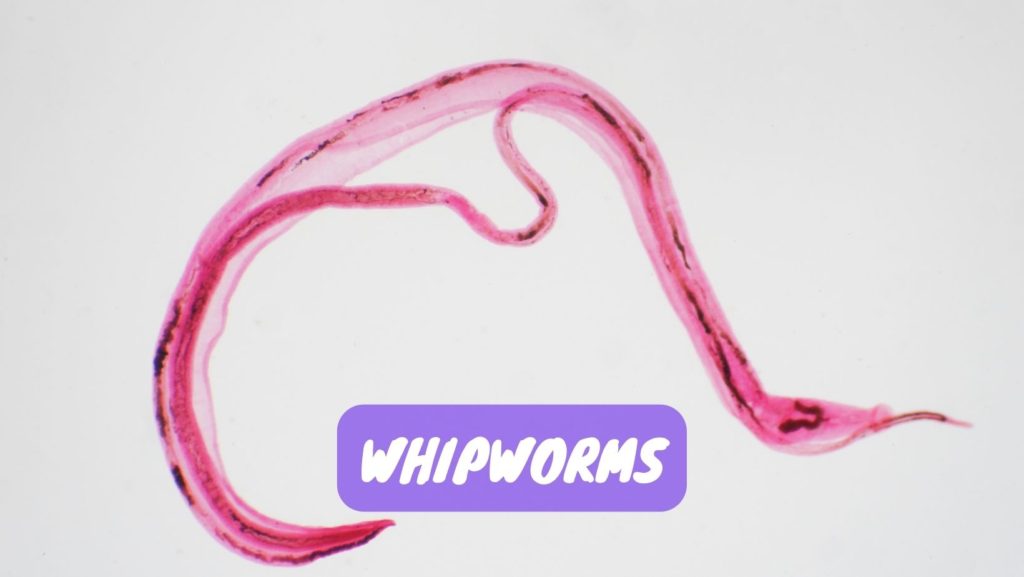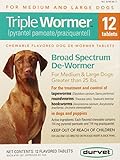Worried, how did your dog get Whipworms? Do thoughts like, ‘How will Whipworm affect my dog’s health’ concern you? If questions like these are often in your mind, you have reached the right place.
Dogs throughout their lifetime suffer from multiple parasitic infections. And one of the most common intestinal parasitic worms that attack dogs is Whipworms.
Whipworms, scientifically known as Trichuris vulpis, are intestinal parasites. These worms live inside a dog’s large intestine, particularly the cecum. Whipworms are small, nearly 1/4th inch long, and shaped like a whip.
On the one hand, a thick section resembles a whip handle, whereas, on the other hand, it has a narrow section that looks like a whip.
They generally attach to the mucosal lining and, when in large number, can cause severe discomfort to the dog.
Whipworms in Dogs – Symptoms, Causes, Treatments
Whipworms are one of the four common intestinal parasites that attack dogs and cats. Dogs with a minor or initial Whipworm infection won’t show any sign of illness.
However, when the infection is severe and in a crucial stage, its symptoms and impact can appear extreme. Besides causing serious and painful illness, a severe Whipworm infection can also cause death in dogs.
Here is all about symptoms, Causes, and Treatments for Whipworm infection in dogs.

Symptoms of Whipworms in Dogs
Like any other parasitic infection, dogs don’t show any symptoms during the early stage of a Whipworm attack.
Or, with light parasite loads, a whipworm infection is generally asymptomatic, and even a medical diagnosis may fail to capture it.
Though when the infection is crucial and heavier, pet parents might notice the following symptoms,
- Diarrhea
- Weight Loss
- Anemia
- Blood in Stools
- Gastrointestinal inflammation
- Electrolyte imbalances
Since whipworms are so small, it is difficult for pet parents to notice them in the stool. And even if one does, the worms will appear very tiny, almost dot-like.

Causes of Whipworm in Dogs
Worm infection, no matter which one, in particular, is spread due to a few common reasons.
Whipworms spread to dogs, cats, and humans through eggs passed out in infected animals’ stools. A dog or cat infected with a severe Whipworm infection will likely pass worm eggs through its stools.
Later these eggs will thrive in warm and moist soil and may remain there for several years. Whipworm eggs mature within a period of two to four weeks into an infective stage. It is when the eggs are capable of infecting a new host.
The only way dogs can be self-infected with Whipworms is by consuming contaminated soil or worm eggs directly from the atmosphere.
Diagnosis and Treatment of Whipworm in Dogs
Diagnosing whipworm or whipworm infection isn’t possible for every individual since only experts diagnosing personal can do so.
Whipworms and their worm eggs are so tiny that one cannot see them with naked eyes.
That is why veterinarians take the stool sample, mix it with a certain solution and examine it with a microscope.
And since Whipworms pass irregularly, it may take multiple diagnoses before finding worm eggs in a dog’s stool.
That is why, in cases when symptoms of the infection are very prominent, Veterinarians deworm dogs based on them.
For treating Whipworm infection in dogs, the only possible method is Deworming. Vets generally recommend common dewormers.
The drug may include fenbendazole (Panacur), milbemycin, febantel (Drontal Plus), moxidectin, or oxantel.
- Mix the daily dose with a small amount of your dog’s usual food; Your dog should eat all of the medicated food; If feeding dry dog food, it may need to be moistened to aid mixing
- Repeat the daily dose for 3 days in a row (each packet is a daily dose depending on your dog's size)
- If dog's weight is in between suggested dosing sizes, it's safe to use the next higher size; For example a 15 pounds dog should be treated with the 2gm packet
- Safe for all Dogs 6 weeks and older, including pregnant Dogs
- Deworming schedules may vary depending on the climate where you live and the activity of your dog
- Convenient 12 Pack
- Non prescription
- Controls seven strains of tape; hook and roundworms
- Chewable Tablets ; Packaging may vary
- Feeding directions - 25.1 to 50.0 pounds, give 1 Medium/Large Dog(114mg) tablet . 50.1 to 100.0 pounds, give 2 Medium/Large Dog(114mg) tablets. 100.1 to 150.0 pounds, give 3 Medium/Large Dog(114mg) tablets. 150.1 to 200.0 pounds, give 4 Medium/Large Dog(114mg) tablets
In some cases, even heartworm preventers work for treating Whipworm infections in dogs.
A proper deworming course can cure your dog of Whipworm infection. Even repetition of deworming medicine is essential for preventing reinfection.
How did my dog get whipworms?
The only way for dogs to catch Whipworm infection is by eating worm eggs. Canines typically get the infection after consuming soil, water, or food contaminated with Whipworm eggs.
These eggs get into these surfaces through the dog’s feces. Further, when dogs or cats poke their face on any of these surfaces, chances are they might catch an infection.
Where do whipworms come from?
Whipworms are ever-existing parasites that attack dogs, cats, and humans alike. They come from eggs of already existing adult whipworms.
Anyone, be it humans or animals, accidentally catch Whipworm infection by consuming whipworm eggs.
One can pick those eggs by consuming vegetables or fruits that have not been washed or cooked carefully.
Or, kids who play in soil and then take that hand directly into their mouth are more prone to catching a Whipworm infection quickly.
Do Dogs get Whipworm infection? 6 Facts and Reasons
- Whipworm eggs are so tiny that one cannot examine them with naked eyes.
- Light or mild Whipworm infection may show no to very little infection.
- Diagnosing Whipworm infection through one single test is really difficult. Since dogs do not poop Whipworm eggs in every stool, the examination may take multiple rounds.
- Whipworms cannot pass directly from dogs to dogs, cats, or humans.
- Whipworm infection can reoccur even the next day after recovery.
- Whipworm infection can only spread by consuming worm eggs.
How contagious are whipworms in dogs?
Whipworms are moderately contagious in dogs. The infection does not spread directly from dog to dog but only after consuming worm eggs.
For dogs who come in contact with an environment where another pet has released infective eggs through stool, worm infection is likely high.
However, besides that, there are no traces and possibilities of this infection spread amongst animals as well as humans.
What are the signs of whipworms in dogs?
Dogs with light or mild Whipworm infection may show very minimal or even no symptoms of illness at all.
However, if the infection is at its crucial stage or left unattended for long, the following symptoms may appear:
- Loss of appetite and Weight loss.
- Diarrhea
- General debilitation
- Anemia
- Blood or mucus in stool.
Do dogs poop out Whipworms?
Yes, an infected dog can poop out Whipworms with stool.
Whipworms in the dog’s stool appear like tiny pieces of thread with an enlarged end.
The worms possibly are to be seen with naked eyes by pet parents.
However, pet parents will likely notice whipworms in their dog’s poop if the worms are in large number.
A few of them may often go unnoticed until one deeply examines by physically diagnosing the poop.
Will Whipworms Kill a Dog?
Whipworms generally don’t trouble dogs until the infection is at a crucial stage. Until a long time after the illness, pet parents may not notice even a tiny sign or symptom.
However, once the disease starts becoming prominent, the symptoms occur repeatedly and more visibly.
Later, if the infection is not recognized or treated, it may hamper the dog’s growth and, at times, even lead to death.
Can a dog fully recover from Whipworms?
With necessary supportive care and proper medication, dogs can fully recover from Whipworm infections.
However, Whipworms are a little challenging to control, and removing them from the environment entirely is nearly impossible.
Whipworm eggs can stay in the environment for four to five years under the right conditions, including moisture and warmness.
And also, since the eggs are so tiny (invisible with naked eyes), removing them from our surroundings is almost impossible.
The presence of Whipworm eggs in the atmosphere can likely infect the same dog twice and time again.
That is why, even when your dog has fully recovered from the infection, it is essential to keep them under quarterly deworming prevention for always.
How long does it take for a dog to recover from whipworms?
The recovery time for dogs suffering from Whipworm infection depends upon the severity of the case.
If the infection is at its initial or even middle stage, the conditions will improve within a few weeks of deworming.
However, when the infection is in its crucial stage, it can take three months of treatment and necessary care to see more improvement.
How much does it cost to treat Whipworms?
The cost of treating Whipworm infection in dogs will range from $200 to $400 easily. This estimation will include a physical exam, fecal exam, and medication altogether.
In circumstances when the infection is severe, the medication phase will extend a little longer, also adding up to the cost.
The cost of treating Whipworm infection in dogs depends majorly upon several factors like
- Dog’s age, weight, and breed.
- The severity of infection.
- Veterinarian’s individual charges.
- A number of diagnoses it required to find out the severity of the disease.
- The area.
Can you get whipworms from your dog if they lick you?
No, there is no possible evidence suggesting that Whipworms can transfer from dogs to humans simply by licking.
It is until a human accidentally consumes Whipworm eggs that no other way leads them to catch the infection.
Should I adopt a Whipworm Positive Dog?
Adopting a dog with Whipworm infection is a very personal choice.
Individuals who opt for adopting dogs from shelters might accidentally or purposely land up with a Whipworm Positive Dog.
Bringing a dog home with any worm infection won’t make you suffer. The proper care and treatment can recover most dogs from these illnesses.
However, if the dog you adopted is suffering from a very severe infection, the days forward might check your patience. Dealing with the symptoms and suffering of the infectious dog is a task in itself.
Even when you are quick with giving him the proper treatment, it may take days and weeks before any visible improvement.
That is why, until you are fully prepared to give your time, efforts, and money to treat a dog’s worm infection, avoid adopting one with the same.
- For Further Reading
- How Long Does It Take For Worms To Leave A Dog?
- Can I Get Worms From My Dog Sleeping In My Bed?
- Live Worms In Dog Poop After Deworming?
Wrapping up…
It is common for dogs to catch Whipworm infection once and repeatedly. That is why quarterly deworming, and an annual precautionary diagnosis is a must.
Whipworms in dogs are thankfully curable. With Vet’s supervision, pet parents can make their dog recover from the infection within no time.
However, the only idea is to prevent dogs from poking their face on soil and other shit in the environment. And further, every single time you notice any symptom, make sure you react as soon as possible.


